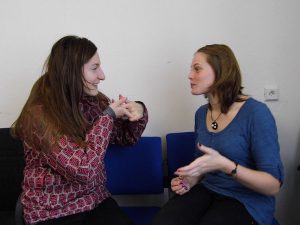I recently attended a highly intriguing talk given by Matthew Harwood about Internal Family Systems Therapy. If that sounds like therapy for dysfunctional families, then that’s what I assumed at first too, but the ‘family’ is internal and consists in the different voices within ourselves. The assumption is that we can engage in an integrative process by careful negotiation with those voices. Harwood showed a moving video showing how the technique could be used to help someone with post-traumatic stress from the Vietnam War, but the method seemed to me to have huge potential going beyond formal therapy, and to potentially have a very strong relationship to the Middle Way.
To begin with, the voices were identified using a technique with elements of active imagination and focusing. You look for something in your experience that represents a particular feeling or perspective within you, which could be something you can imaginatively see, hear, feel or intuit. For example, you might have a feeling of anxiety, but also another voice within you that says you shouldn’t really have this anxiety and have nothing to be afraid of. To get closer to the source of such fear, a process of negotiation is needed with the different parts of yourself that may, with the best of intentions, be guarding you from it. The assumption is always that the parts of yourself have your best interests at heart, and should always be negotiated with, never forced. When asked they may well be willing to step aside, if they are in the way. If they’re associated with overpowering emotions, they may even tone them down a bit to avoid overpowering you.
One thing that I found very striking about this approach, and that reflects Middle Way Philosophy, is its assumption that there are no ‘bad’ desires or beliefs, only conflicts and polarisations between them. If one reflects that the different polarised parts of oneself are likely to make use of absolutisations (“You can’t do that!”, “Fear is inevitable”, “God ordained it” and so on) the widespread potential for this approach to help us work with absolutisations becomes obvious. By imagining the absolute belief as a person, or something like a person, that is attached to our desires and thus is not only made up of the absolute belief, we also give it the kind of respect it craves, and we then cease to dismiss it or idealise it in the way we might a mere abstraction.
The therapy talks, in the Jungian sense, about a ‘self’, which I take to be the integrative experience of ourselves beyond these polarising elements. This ‘self’ could be interpreted in an entirely provisional way, as the self that we have so far not identified any absolutisations or polarisations in. As soon as we identify something further within us that appears to be conflicting, we split it off from the ‘self’ and give it a separate identity and a separate respect.
This kind of inner dialogue will be familiar to any reader of Jung’s Red Book, which is full of such dialogues with archetypal characters. Broadly speaking I think we can interpret the Red Book as a similar integrative journey, though obviously one that is more complex than the example I watched on video of a therapeutic intervention with a Vietnam veteran. It seems to me that if we meet archetypal characters like Jung’s (for example, ones that feel like a hero, or a Shadow, or an anima/us, or a wise old man or woman) a very similar approach could be taken to that used in the therapy. If the archetypes are polarising or absolute, then they are obviously projections, and we’ll need to negotiate with them to try to avoid that projection.
The idea of ‘internal family systems’ can perhaps offer a reminder that whatever we do internally also has an impact on our external families, and anyone else we interact with. All of these external people will also have their internal parts, and we can interact with those parts as we do with our own, though of course less directly. So it is no coincidence that the developer of Internal Family Systems Therapy, Richard Schwartz, started off with external families. Surely not only the conflicts between family members, but also all those between people, depend basically on responding to each other in recognition that we are not just single entities?
For further information on Internal Family Systems Therapy see this page.
Picture: Dialogue by Mikhail Gorbhunov CCSA3.0
